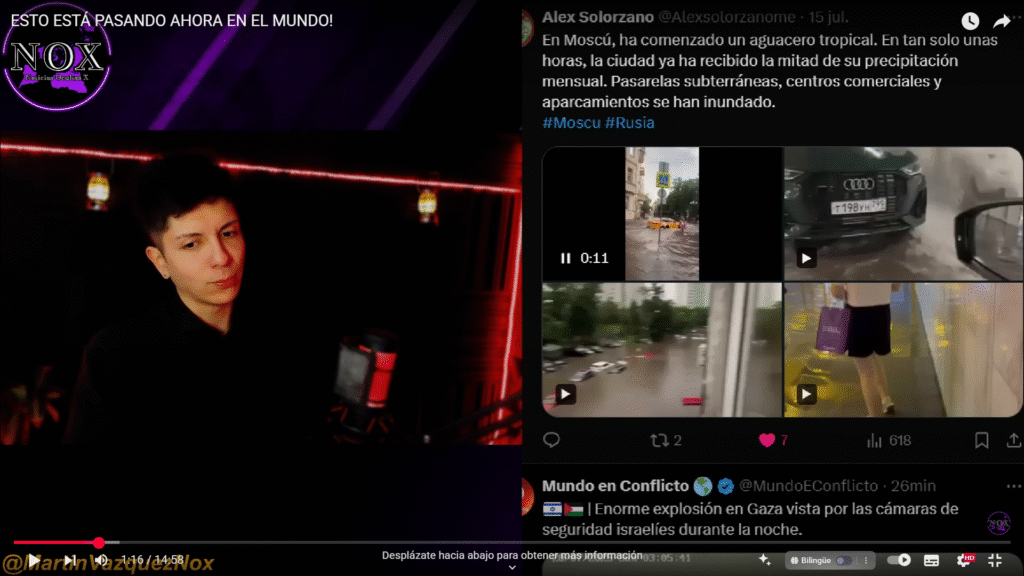The world under pressure: climate chaos, plagues, and political instability mark an unprecedented week
Amid a whirlwind of news that seems straight out of an apocalyptic script, the planet is experiencing a string of extreme events that not only test the affected populations but also raise increasingly common questions: Are we experiencing an acceleration of catastrophes? Are they natural warnings? Or simply coincidences amplified by the media?
While Hong Kong is battered by the powerful Typhoon Wifa with gusts of up to 160 km/h, other parts of the world are also experiencing moments of chaos. In kyiv, a plague of giant locusts has begun devastating crops, a phenomenon not seen in decades. And if that weren’t enough, flash floods are hitting Moscow, New Jersey, New Mexico, and New York. The disturbing toxic smog over Buenos Aires adds even more mystery to a scenario that seems straight out of the most disturbing prophecies.
This article analyzes the causes, consequences, and possible connections between these events, seeking to offer a comprehensive view that helps us understand the global phenomenon we are witnessing.
What is happening with the climate and the global environment?
Extreme weather events are no longer isolated occurrences: their frequency has increased in recent years. Typhoon Wifa, currently battering Hong Kong, has prompted mass evacuations and injuries from the intense winds that have literally knocked people off their feet. Local authorities have urged residents to stay indoors, given the constant risk of flying debris.
Simultaneously, a locust plague of biblical proportions has invaded the Zaporizhzhia region of Ukraine, an area already ravaged by the conflict with Russia. This plague evokes ancient historical and religious records, prompting both scientific and spiritual interpretations.
Added to this are sudden, torrential downpours in key cities like Moscow, where more than 50% of the total monthly rainfall fell in just a few hours. Similar events have occurred in New Mexico and New Jersey, with streets completely flooded and damages in the millions.
In Buenos Aires, a strange and persistent fog was detected a few days ago. Witnesses report that it caused eye and skin irritation. Although there is still no official explanation, many citizens expressed concern about the lack of advance warnings.
Key impacts of these recent events
- Disruption of basic services: Storms and typhoons have affected power supplies, public transportation, and internet access in several regions.
- Agricultural losses: Locust invasion threatens entire harvests, potentially driving up food prices in Eastern Europe.
- Forced migration: Extreme conditions are forcing families to leave their homes, whether due to material damage or dangerous health conditions.
- Crises in global governance: With natural events overlapping with political tensions, governments face multiple crises simultaneously.
- Social alarm and the rise of alternative theories: many people are beginning to question whether what we’re experiencing is simply climate change, or whether there’s a deeper spiritual or geopolitical dimension behind it.
How to prepare for an uncertain future? Practical steps to address global change
Although many of these disasters seem inevitable, there are actions you can take to protect yourself and stay informed:
- Get your information from multiple sources: Don’t rely on just one medium. Compare information from independent, scientific, and local channels.
- Have an emergency kit ready: include drinking water, a flashlight, a radio, batteries, important documents, and medications.
- Learn basic first aid: knowledge saves lives. Knowing how to respond to injury, suffocation, or hypothermia can be vital.
- Prepare an evacuation plan: Identify safe spots near your home and determine how to communicate with your family if your signal goes out.
- Monitor atmospheric phenomena with reliable apps: tools like Windy, Earth Nullschool, or Google Alerts can warn you of anomalies.
- Get involved in your community: Neighborhood organizing can be key to distributing resources, helping seniors, and maintaining order in critical situations.
- Assess your mental health: Climate stress is real. Talk to friends, family, or therapists if you’re feeling overwhelmed.
Additional tips for understanding the background of events
Beyond natural phenomena, geopolitical tensions have also come to light in recent days that could be indirectly related to this global atmosphere of chaos:
- Putin received an advisor to Iran’s supreme leader , rekindling debate over Iran’s nuclear program and its implications for world peace.
- New details about the relationship between Prince Andrew and Jeffrey Epstein have rekindled the controversy over high-level cover-up networks.
- The Donald Trump administration has fired the prosecutor in the Epstein case , raising suspicions about maneuvers to prevent the full disclosure of names implicated in the list of flights to the tycoon’s island.
These political events cannot be completely separated from the current social climate. Many citizens are beginning to talk about a global awakening, a “systemic collapse,” or even signs that, depending on the belief, can be interpreted as divine messages or spiritual warnings.
Prepare for the unexpected, but with awareness and action
Although we can’t control nature or predict future events with certainty, we can decide how to confront them. Whether you see them as climate change, geopolitical conspiracies, or mystical signs, the truth is that we are experiencing an unprecedented global transformation.
Don’t ignore what’s happening. Share the information with those you love. Stay alert, but not afraid: stay prepared, aware, and supportive. Because if this time has taught us anything, it’s that only together can we withstand whatever comes.
Prepare, educate yourself, and act. The change has already begun.
Would you like to continue receiving analyses like this? Share this news, subscribe to the channel, and join the conversation.



